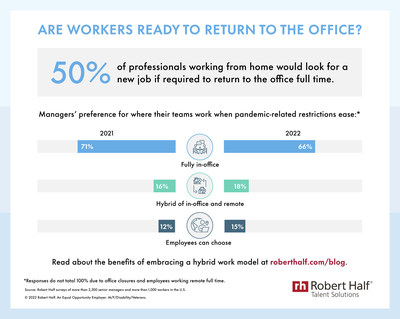Half Of Workers Would Rather Quit Than Return To The Office Full Time, Robert Half Research Shows
Research from Robert Half reveals that 66% of U.S. senior managers want employees back on-site full-time, despite a growing preference for flexible work arrangements. Only 33% support long-term hybrid schedules. A significant risk noted is that 50% of remote workers would seek new jobs if forced back to the office, particularly among working parents (55%) and millennials (65%). Experts suggest that companies should consider a hybrid model to retain talent and maintain productivity. Strategies for implementing flexibility include defining hybrid work, improving onboarding, and ensuring effective communication.
- 66% of senior managers favor a return to full-time office work, indicating potential growth in office-related activities.
- Shift towards flexibility may lead companies to adopt hybrid models, which could attract talent.
- 50% of current remote workers may seek new jobs if required to return to the office full time, posing a retention risk.
- Only 33% of managers support long-term hybrid work, limiting the adoption of flexible arrangements.
- Majority of companies want staff back on-site, which could lead to turnover
- Working parents and millennials most likely to look for a new job if required to be in the office five days a week
- Future of work expert offers strategies for shifting to a flexible model that benefits all
MENLO PARK, Calif., March 22, 2022 /PRNewswire/ -- After two years of uncertainty, many companies are eager to call employees back to the office for good, new research from talent solutions and business consulting firm Robert Half shows. In a survey of more than 2,300 senior managers in the U.S., two-thirds of respondents (
Currently, only 1 in 3 senior managers support long-term hybrid schedules (where staff can divide time between the office and another location) and employees' ability to choose where they work. Those in technology (
View an infographic of the research highlights.
The Risk of an Employee Exodus
Return-to-office plans may lead to more resignations, separate research from Robert Half shows. In a survey of more than 1,000 professionals, half of respondents currently working from home (
"Employers may be holding onto the idea that the office is the best place to collaborate, innovate and get things done — but workers feel otherwise," said Robert Half senior executive director Paul McDonald. "Companies already face retention challenges, and taking away remote options will only exacerbate the problem. Hybrid work models give employers and employees flexibility and choice and are the way forward."
How to Embrace a Flexible Work Model
Companies may want to adopt a long-term hybrid work model but not know where to start. Trisha Plovie, senior vice president of future of work at Robert Half, offers five questions to help guide the process:
- How will you define "hybrid"? Will employees be required to come to the office certain days each week or only for specific purposes, such as trainings or team building?
- How can you improve your onboarding experience? As you hire remote employees, consider how you will make them feel welcome, supported and part of a team they might never meet in person.
- Do you have the right technology to support effective communication and collaboration? Consider what new tools to implement to create a seamless experience for onsite and remote staff.
- What business processes will be impacted? Anticipate problems, adjust workflows and ensure everyone has access to the resources they need.
- How will you build and maintain engagement and morale? Create equal opportunities for all employees to grow and develop, network, and build authentic relationships with colleagues.
Read more about the benefits of embracing a hybrid work model on the Robert Half blog.
About the Research
The online surveys were developed by Robert Half and conducted by independent research firms. They include responses from more than 2,300 senior managers in finance, technology, marketing, legal, administrative and customer support, human resources, and other areas at companies with 20 or more employees (collected November 11 to December 30, 2021), and more than 1,000 workers 18 years of age or older (collected March 3-11, 2022) in the U.S.
About Robert Half
Robert Half (NYSE: RHI) is the world's first and largest specialized talent solutions and business consulting firm that connects opportunities at great companies with highly skilled job seekers. Robert Half offers contract, temporary and permanent placement solutions and is the parent company of Protiviti®, a global consulting firm. Visit roberthalf.com and download our award-winning mobile app.
![]() View original content to download multimedia:https://www.prnewswire.com/news-releases/half-of-workers-would-rather-quit-than-return-to-the-office-full-time-robert-half-research-shows-301507519.html
View original content to download multimedia:https://www.prnewswire.com/news-releases/half-of-workers-would-rather-quit-than-return-to-the-office-full-time-robert-half-research-shows-301507519.html
SOURCE Robert Half
FAQ
What percentage of senior managers want employees to return to the office full time?
How many remote workers would consider quitting if required back in the office full time?
Which demographics are most likely to quit if required to work in the office full time?
What is the support level for hybrid work among senior managers?








